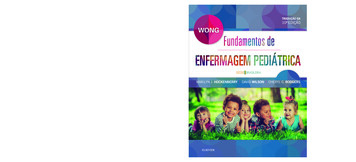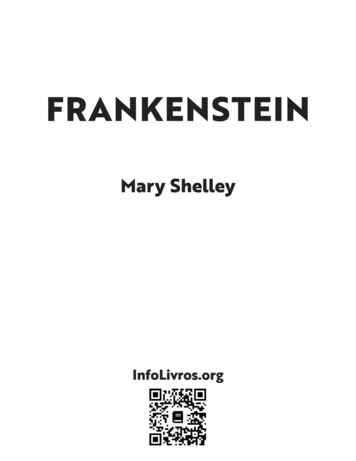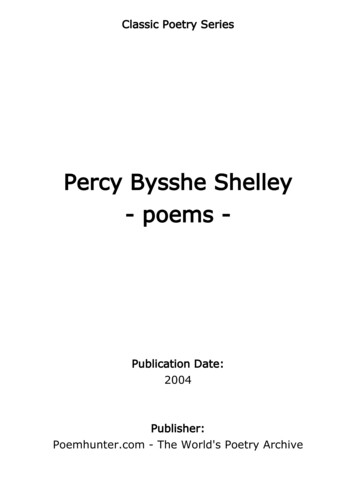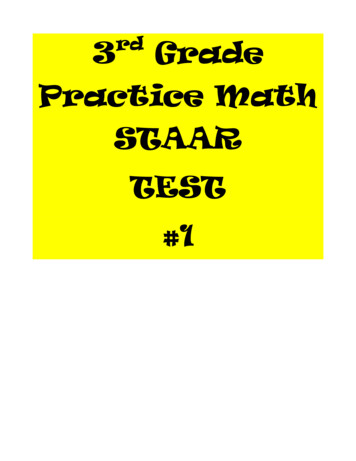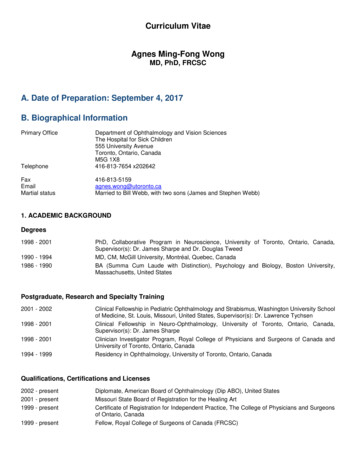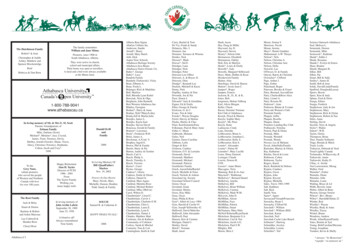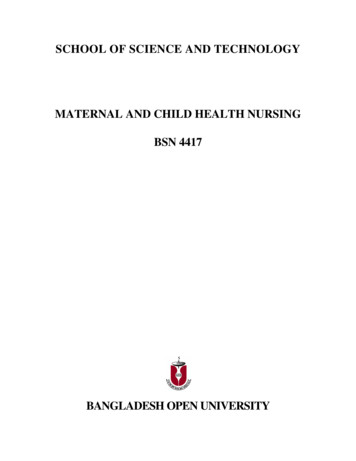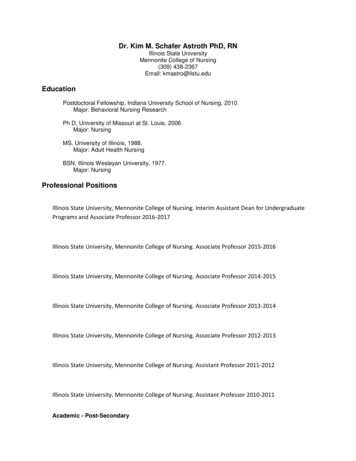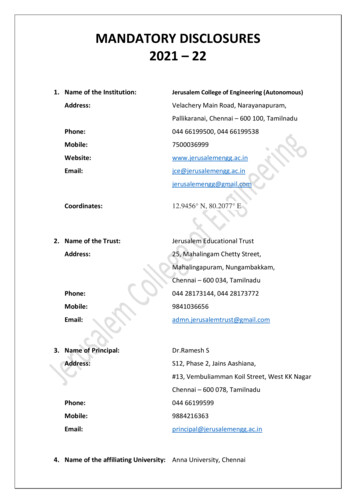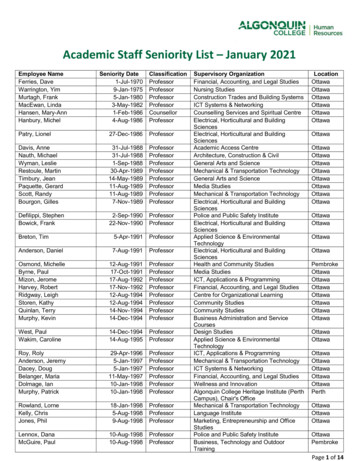
Transcription
SHELLEY D. WONGAssociate ProfessorMulticultural, Multilingual EducationTeaching Culturally & Linguistically Diverse &Exceptional Learners Division of AdvancedProfessional Teacher Development & International Education College of Education andHuman DevelopmentGeorge Mason UniversityFairfax, Virginia 22030-4444Current PositionAssociate Professor of Education, Graduate School of Education, College of Education andHuman Development, George Mason UniversityEducationEd.D. Applied Linguistics, Columbia University Teachers College, NY, 1990M.A. Teaching English as a Second Language, University of California at Los Angeles, CA(UCLA), 1986B.A. Sociology, University of California at Santa Cruz, CA 1971.Additional Formal Training1971-1973 Cantonese and Mandarin Classes, New Asia-Yale in China Language Center,Chinese University of Hong KongCertification and Licenses1974-1977 T.E.S.L. Certification and Secondary and Adult Teaching Credentials, Social Studies& E.S.L., UCLASelected Honors, Awards, Fellowships2018-2019Nominated for the Lifetime Achievement Award, American Educational ResearchAssociation, Div. G. Social Contexts of Learning2018-2019Fulbright Scholar Award to Birzeit University, West Bank, Palestine2014-present Honorary Editorial Board Member, Ubiquity: The Journal of Literature, Literacy& the Arts. http://ed-ubiquity.gsu.edu/wordpress/people/
2014Spirit of Martin Luther King Award, Office of Diversity, Inclusion andMulticultural Education (ODIME), George Mason University2013Social Justice Faculty Learning Community-Center for Teaching ExcellenceGeorge Mason University2012Center for International Student Access (CISA) Faculty Fellow Provost’s Office,George Mason University2012English Language Specialist, Teaching English as a Foreign Language (TEFL)and Teaching English to Speakers of Other Languages (TESOL), U.S.Department of State Bureau of Educational and Cultural Affairs2003TESOL Heinle and Heinle Excellence in Teaching Award, TESOL AnnualConvention, Baltimore, Md.2001-2002Critical Difference for Women Award, Women of Color Advancement GrantsCommittee OSU.2000-2001Ohio Teaching Enhancement, Office of Teaching and Faculty Development1997Celebrating Teachers-Outstanding Teaching Award, Center for TeachingExcellence, University of Maryland at College Park1994-1995Lilly-Center for Teaching Excellence Fellow, University of Maryland at CollegePark1994Abacus Award for Community Service, Organization of Chinese AmericansNational Convention, Los Angeles.1992Faculty Fellowship for the Curriculum Transformation Project: Summer FacultyInstitute on Women, Gender and Race (June-July), University of Maryland atCollege Park1989National Scholar Award, National Association for Asian and Pacific AmericanEducationPublications BooksWong, S., Sánchez-Gosnell, E., Foerster-Lu, A. & Dodson, L. (Eds.). (2018) Teachers as Allies:Transformative Practices for Teaching DREAMers and Undocumented Students. NewYork: Teachers College Press.Nasser, I., Berlin, L.N. & Wong, S. (Eds.) (2011) Examining education, media and dialogueunder occupation: The case of Palestine and Israel. Bristol, U.K.: Multilingual Matters.
Wong, S. (2011) Dialogic Approaches to TESOL: Where the ginkgo tree grows. New York:Taylor & Francis/Routledge.Chapters in edited books (* indicates peer reviewed; indicates invited)*Wong, S. & Crewalk, J. with R. Velasquez-Soto (2018) Undocumented students, families, andcommunities in our schools: What every teacher should know. In S. Wong, E. SánchezGosnell, A. Foerster-Luu, & L. Dodson (Eds.) Teachers as Allies: TransformativePractices for Teaching DREAMers and Undocumented Students (pp. 1-16). New York:Teachers College Press.*Wong, S. & Grant, R. (2016). Racializing justice in TESOL: Embracing the burden of doubleconsciousness. (pp. 165-176). In L. Jacobs & C. Hastings (Eds.) Social justice andEnglish language teaching. Charlotte, NC: Information Age Publishing & TESOLInternational.*Austin, T., Pirbhai-Illich, F., Grant, R., Wong, S., Tinker Sachs, G., Nasser, I., Kumagai, Y.(2015). From research to transformative action: Interpreting research critically. (pp. 183195). In Bhopal, K., & Deuchar, R. (Eds.). Researching marginalized groups. New Yorkand London: Routledge. Wong, S.D. & Grant, R.A. (2014). Womanist and critical race theory for peacemaking inmultilingual, multicultural classrooms. (pp. 29-52) In R. Oxford (Ed.) Understandingpeace cultures. Charlotte, NC: Information Age Publishing.*Wong, S. & Saroughi, M. (2012). Language Exposure in Farsi: Nonkilling linguistics andTeaching English to Speakers of Other Languages. In Patricia Friedrich (Ed.), NonKilling Linguistics: Practical Applications (pp. 87-102). Honolulu, Hawaii: Center forGlobal Non-killing. http://nonkilling.org/node/18 Wong, S. (2012). Involvement in leadership roles in professional organizations. In R. Kubota &Y. Sun (Eds.), Demystifying career paths after graduate school: A guide for secondlanguage professionals in higher education (pp. 163-176). Charlotte, NC InformationAge Publishing, Inc.Nasser, I., Berlin, L.N. & Wong, S. (2011). Introduction. In Nasser, I., Berlin, L.N. & Wong, S.(Eds.) Examining education, media and dialogue under occupation: The case ofPalestine and Israel. (pp. xxiii-xxxvii) Bristol, U.K.: Multilingual Matters.Wong, S., & Nasser, I. (2011) Positionalities and personal perspectives on educational researchunder occupation: Where is hope? In Nasser, I., Berlin, L.N. & Wong, S. (Eds.)Examining education, media and dialogue under occupation: The case of Palestine andIsrael. (pp. 34-48) Bristol, U.K.: Multilingual Matters.Wong, S., Nasser, I & Berlin, L.N. (2011) Where is the hope? A call for action. In Nasser, I.,Berlin, L.N. & Wong, S. (Eds.) Examining education, media and dialogue under
occupation: The case of Palestine and Israel. (pp. 233-240) Bristol, U.K.: MultilingualMatters. Bangou, F. & Wong, S. (2009). Race and technology in teacher education: Where is the access?R. Kubota & A. Lin (Eds.) Race, Culture, and Identities in Second Language Education:Exploring critically engaged practice. London: Routledge. Grant, R. & Wong, S. (2008). Critical race perspectives, Bourdieu and language education. (pp.162-184). In A. Luke and J. Albright (Eds.), Bourdieu and literacy education. New York:Routledge. Wong, S. (2007). "Critical commentary on critical thinking: Facts and opinions, writer'spurpose Ms Mok's case"(pp. 9-11). In G. Tinker Sachs and B. Ho (Eds.)ESL/EFL Cases: Contexts for Teacher Professional Discussions. Hong Kong: CityUniversity of Hong Kong Press. Wong, S. & Grant, R. (2007). Academic achievement and social identity among bilingualstudents in the U.S. (pp. 681-691). In Jim Cummins and Chris Davison (Eds.) Theinternational handbook of English language teaching: Vol. 2. New York: Springer(formerly Kluwer Academic Publishers). Wong, S. (2006). Perpetual foreigners: Can an American be an American? In A. Curtis and M.Romney (Eds.) Color, race, and English language teaching: Shades of meaning. (pp. 8192). Mahwah, New Jersey: Lawrence Erlbaum Associates, Inc. Lin, A., Kubota, R., Motha, S., Wang, W. & Wong, S. (2006). Theorizing experiences of Asianwomen faculty in second and foreign language teacher education. (pp. 56-82) In G. Li, &G. Beckett (Eds.), “Strangers” of the academy: Asian female scholars in highereducation. Virginia: Stylus Publishing.*Grant, R. & Wong, S. (2005). Barriers to literacy for language minority learners: An argumentfor change in the literacy education profession. In P. Shannon & J. Edmondson (Eds.),Reading education policy: A collection of articles from the International ReadingAssociation. (pp. 214-227). Newark, DE: International Reading Association.*Wong, S. (1996). Preparing young second language learners for the inclusion of children withspecial needs. In L. Schinke-Llano & Rauff (Eds.), New ways in teaching young children(pp. 11-12). Alexandria, VA: Teachers of English to Speakers of Other Languages, Inc.*Wong, S. (1994). Dialogic approaches to teacher education in the teaching of English writing tospeakers of other languages. In David Li, D. Mahoney & J. Richards (Ed.), Exploringsecond language teacher development (pp. 101-112). Hong Kong: City Polytechnic.*Wong, S. (1993). Telling her stories: Multicultural diversity workshop for student teachers.New Ways in TESOL Series, J. Richards, Series Ed. In D. Freeman (Ed.) New ways in
teacher education (pp.200-204). Alexandria, VA: Teachers of English to Speakers ofOther Languages, Inc.*Wong, S. (1993). Cultural context: Exploring the nexus between medicine and ministry. In T.Boswell, R. Hoffman & P. Tung (Eds.), English for professional communication (pp.115-126.) Hong Kong: City Polytechnic.Journal Articles (* indicates peer reviewed; indicates invited) Wong, S. (2019). From the U.S. Mexican border to Palestine: A call to critical literacy andaction. Journal of Language and Literacy Education. 15(1). Available /05/SSO May2019 Wong.pdf*Shin, H.Y. & Wong, S. (2017). Formation of Korean heritage schoolteachers’ transnationalidentity. Journal of the National Council of Less Commonly Taught Languages, 21, 127143.*Wong, S. & Grant, R. (2014). The Clothesline Project: Arts-in-action to end the violenceagainst women. Ubiquity: The Journal of Literature, Literacy, and the Arts. PraxisStrand, 1(1), 49-67. 1/*Nasser, I. & Wong, S. (2013). Examining social political contexts in teacher preparation inPalestine. Teaching Education, 24(4), 427-446. DOI: 10.1080/10476210.2012.739600 Wong, S. & Grant, R. (2011). Nurturing cultures of peace with dialogic approaches to languageand literacy. Approach: A Journal of English Language Teaching in Cuba, 9, 7-16.*Wong, S. & Grant, R. (2009). Nurturing cultures of peace with dialogic approaches to languageand literacy. TESOL in Context: Journal of ACTA, Australian Council of TESOLAssociations, 19(2), 4-17. Wong, S. (2000). Transforming the politics of schooling in the U.S.: A model for successfulacademic achievement for language minority students. In Joan Kelly Hall and WilliamEggington (Eds.), The sociopolitics of English language teaching. Multilingual Matters.(pp. 117-139).Bright, A. & Wong, S. (2009) Uncovering bias in school curriculum: And what else do we teach.Mosaic, 2(1), 23-34.Osterling, J.P. & Wong, S.D. (2008). Dangerous discourses and uncomfortable silences. Journalof Praxis in Multicultural Education. 3(1), 3-16.*Wong, S., Nasser, I., & Berlin, L. (2008). Dialogue under occupation. Commentary inLanguage Policy, 7:165-170.
Grant, R.A., Wong, S.D. & Osterling, J.P. (2007). Developing literacy in second languagelearners: Critique from a heteroglossic sociocultural and multidimensional framework.Reading Research Quarterly, 42(4), 598-609.*Wong, S. & Motha, S. (2007). Multilingualism in post 9-11 U.S. schools: Implications forengaging empire. Peace & Change: A Journal of Peace Research, 62-77.*Lin, A., Grant, R., Kubota, R., Motha, S., Tinker Sachs, G., Vandrick, S., and Wong, S. (2004).Women faculty of color in TESOL and literacy education: Theorizing our livedexperiences TESOL Quarterly, 38(3), 487-504.*Grant, R. & Wong, S. (2004). Forging multilingual communities: School-based strategies.Multicultural Perspectives, 6, 17-23. Grant, R. & Wong, S. (2003) Multilingual literacy: helping students and teachers. AuthorsReply to J. Fitzgerald’s Letter to the Editor. Journal of Adult and Adolescent Literacy(JAAL), 47(2), 118-120.*Grant, R. & Wong, S. (2003). Barriers to literacy for language- minority learners:An argument for change in the literacy education profession. Journal of Adult andAdolescent Literacy (JAAL), 46(5), 386-394.*Wong, S. (1999). Pilgrimage curriculum: Teaching English to Chinese theological students.International Journal of Curriculum and Instruction, 1(1), 143-155.* Wong, S. & Teuben-Rowe, S. (1997). Honoring students’ home languages and cultures in amultilingual classroom. Sunshine State TESOL Journal, 20-26.*Pao, D., Wong, S., & Teuben-Rowe, S. (1997). The influence of language on identity formationfor mixed heritage students and the implications for TESOL educators. TESOLQuarterly, 31(3), 622-631.*Wong, S., & Teuben-Rowe, S. (1996). Critical perspectives on the language of family literacyresearch: Use of native language with involved parents from diverse linguisticbackgrounds. The Journal of Educational Issues of Language Minority Students, 16, 235261. Wong, S. (1996). Institutional policies and language minority students in the U.S. TESOLQuarterly, 30(3), 583-586. Wong, S. (1996). Reflections of a course instructor on a critical incident: Racial conflict andcurriculum transformation. Multiculturalism, 16(2), 23-26.*Wong, S., & Grant, R. (1995). Addressing poverty in the Baltimore-Washington metropolitanarea: What can teachers do? Literacy Issues and Practices, 12, 3-12.
*Grant, R., & Wong, S. (1994). Teaching second-language learners: Special considerations forcontent area teachers. Literacy Issues and Practices, 11, 23-29.*Wong, S. (1994). Dialogic approaches to teacher research: Lessening the tension. TESOLJournal, 4(1), 11-13.*Wong, S. (1992). Contrastive rhetoric: An exploration of proverbial references in Chinesestudent L1 and L2 writing. Journal of Intensive English Studies, 6, 71-90.Published ProceedingsWong, S., Yun, Y. Y., Bangou, F. & Chacon, C. (2001). Collaborative research to facilitate nonnative English speaker student voices in a second language acquisition course. In B.Johnson & S. Irujo (Eds.), Research and practice in language teacher education: Voicesfrom the field (pp. 171-191). Carla working Paper #19. Minneapolis, MN: Center forAdvanced Research on Language AcquisitionWong, S. (1997). Transforming teacher education: Multicultural approaches to the teaching ofreading to linguistically diverse students. In C. A. Grant (Ed.) Proceedings of theNational Association for Multicultural Education 1995 (pp.357-365). San Francisco:Caddo Gap Press.Wong, S. (1995). Curriculum transformation: A psycholinguistics course for prospectiveteachers of ESOL K-12. In J. Alatis (Ed.), Linguistics and the education of secondlanguage teachers: Ethnolinguistic, psycholinguistic, and sociolinguistic aspects (pp.471-479). Washington, D.C.: Georgetown University Press.Wong, S. (1992). Dialogic approaches to teacher as researcher. In A. MacGowan-Gilholly (Ed.),Teachers and Students as Researchers: Improving Learning in ESL through Research(pp. 7-10). New York: Instructional Resource Center, CUNY.Book Reviews (* indicates peer reviewed; indicates invited)*Wong, S. (1993). [Review of Sowing Ti Leaves]. [Book] National Women’s StudiesAssociation Journal, 5(2), 278-280.*Wong, S. (1992-93). [Review of With Literacy and Justice for All]. [Book] GreaterWashington Reading Council Journal, 15, 39.Encyclopedia and Dictionary Entries Wong, S., Eng, S.C., Von Esch, K.S. (2018). Critical race pedagogy. J. Liontas (Ed.) CurrentTrends in ELT and Future Directions. TESOL Encyclopedia of English LanguageTeaching. Hoboken. NJ: Wiley/Blackwell Publishers.
Grant, R. & Wong, S. (2018). Addressing cultural bias in ELT materials. In S. Nero (Ed. ofSociocultural Volume), J. Liontas, Editor in Chief, TESOL encyclopedia of Englishlanguage teaching. Hoboken, NJ: Wiley Blackwell.Wong, S. (1997). Dialogic pedagogy. [Definition with commentary] in C. A. Grant & G.Ladson-Billings (Eds.), Dictionary of Multicultural Education, 88-90. Phoenix, AZ: TheOyrx Press.Wong, S. (1997). Limited English Proficiency (LEP). [Definition with commentary] in C. A.Grant & G. Ladson-Billings (Eds.), Dictionary of Multicultural Education, 159-160.Phoenix, AZ: The Oyrx Press.Selected Bulletins, Newsletters and ReportsWong, S. (Summer 2020) Message from Past Chair Kings Bay Plowshares %20%202020%20-%206th%20version%20(5).pdf?ver 202007-25-093550-960Wong, S. (Spring 2020) SIG Chair’s Message. Peace Education SIG ing%202020.pdf?ver 2020-05-27-195804-383Wong, S. (2019) SIG Chair’s Message. Peace Education SIG ised%20031320.pdf?ver 2020-03-13-125154-793Wong, S. (April 2019) Palestine: A Call for Non-Violent Action to Achieve a JustPeace. Global Issues in Language Education (GILE) Newsletter #110, pp. 14-15.The Sister Scholars: Grant, R., Kubota, R, Lin, A., Motha, S., Tinker Sachs, G., Vandrick, S. &Wong, S. (2019, March) Speaking up and pushing back: Women of color in theacademy. TESOLers for Social Responsibility: A Newsletter of the Social ResponsibilityInterest SectionWong, S. (2018, March). Professional growth: Learning keys to success from Cuban EnglishTeachers. TESOLers for Social Responsibility: A Newsletter of the Social ResponsibilityInterest Section. ues/2018-0314/15.html)Dodson, L., Foerster Luu, A. M., & Wong, S. (2017). Advocating For Undocumented StudentsIn Anti-Immigrant Times In The United States. TESOLers for Social Responsibility.Retrieved from es/2017-0921/7.html
Wong, S. (2013). In memory of Charles Hancock 1940-2012. TESOLers for SocialResponsibility Newsletter of the Social Responsibility Interest Section. February 2013.Retrieved from es/2013-0221/email.htmlMorris, S. & Wong, S. (2010) Yong ying yu jiao xue rang shi jie bian de geng mei hao: Zhuanfang qian ren mei guo TESOL hui zhang Shelley Wong. (English education makes theworld a better place: An interview with Shelley Wong, former U.S. TESOL President)English Career, Volume 33, pp. 70-73, June 2010.Wong, S. (2009). New beginnings for peacemaking in Serbia: Report from the ELTAConference. MELT (Magazine for English Language Learners) 12, 2-3.Wong, S. (2008). President’s message. Essential Teacher, Vol 5, Dec., Issue 4, p. 5/Wong, S. (2008). President’s message. Essential Teacher, Vol 5, Sept., Issue 3, p. 5/Wong, S. (2008). President’s message. Essential Teacher, Vol 5, June, Issue 2, p. 5.Wong, S. (2008). President’s message. Essential Teacher, Vol. 5. March, Issue 1, p. 5.Wong, S. (2007). TESOL Advocacy Day 2007: On Renewing NCLB, WA TESOL News, Vol. 38#1, pp. 9-10, November/December.Bangou, F. & Wong, S. (2005). Appropriating technology in foreign language teaching: Asituated approach to the development of pre-service teacher knowledge construction.”Educational Reports. Columbus, Ohio: Ohio State University.Wong, S. & Grant, R. (2003). Strategies to increase TESOL awareness among all U.S. teachers.TESOL Matters, 13(3), 5.Wong, S. (2003) Academic session for TEIS: Listening to multiple voices in teacher education.Teacher Education Interest Section Newsletter, (TEIS Newsletter) 18(2), 6.Wong, S. (2003) Letter from the Chair: Dreams of diversity in teacher education TEISNewsletter, 19 (1), October (new electronic)Wong, S. (2003) An invitation to participate in “Soaring far, catching dreams of diversity inTeacher Education” TEIS Newsletter, 19 (1) October (new electronic)Wong, S. & Grant, R. (2003) Teachers building a culture of peace: Classroom responses to warand terrorism TESOL Connections, Electronic Newsletter. www.tesol.org. DecemberWong, S., Yen, Y.Y., Bangou, F. & Chacon, C. (2000). Reflections on collaborative actionresearch for curriculum transformation of an SLA course. NNEST Newsletter: TheNewsletter of the Nonnative English Speakers in TESOL Caucus, 2 (1), 1, 5-6).
Wong, S. (1999). The research symposium in New York. Friends in TESOL. January 1999, 6.Wong, S. (1998). Parallel perceptions of World Englishes and Ebonics. TESOL TeacherEducation Interest Section Newsletter, 4.Wong S. (1998) TESOL endorses national language policy. Friends in TESOL, June 1998, 3.Wong, S. (1998). TESOL to join NCATE. Friends in TESOL. January 1998. 3.Wong, S. (1997). Caucuses update. Friends in TESOL. August 1997, 3.Wong, S. (1996). TESOL task force on partnerships with language minority communities.Friends in TESOL, June 1996, 5.Wong, S., Groth, L., & O’Flahavan, J. (1995-6). Classroom implications of Reading Recovery.Research Updates from the National Reading Research Center. Reading Today, 13 (3),December 1995/January 1996, 12.Ruopp, K., & Wong, S. (1995). Taking books home: A check-out system for the primary grades.Instructional Resource No. 9. National Reading Research Center. University of Georgiaand the University of Maryland at College Park.Wong, S., Groth, L., & O’Flahavan, J. (1994). Characterizing teacher-student interaction inReading Recovery lessons. Research Report No. 17. National Reading Research Center.University of Georgia and the University of Maryland at College Park.Wong, S., & Amador, H. (1992). Poverty and the ESOL classroom. Talking about TESOL:Secondary School Interest Section Newsletter. December.Wong, S. (1991). Videotaping lectures. WATESOL News, 21(4), p. 7.Lynch, R. & Wong, S. (1988). Beyond the technology: Components for a successful computerlab. TESOL Newsletter, 22(2), p. 5, 10-11.Educational VideotapeWong, S., Friedman, J., Woodlock, S., Camacho, M. (1995). Success in reading with bookshome. National Reading Research Center. NRRC Video Series. University of Georgiaand the University of Maryland at College Park.Electronic Publications ( indicates solicited, *indicates referred) Wong, S. (2008-2009). Presidential Podcasts. http://www.tesol.org posted April, June, August,October, December & February
*Ayish, N. & Wong, S. (2008). Cultural Heritage Project. TESOL Electronic Resource CenterLesson Plan. http://www.tesol.org Added to TESOL Electronic Resource Center May2008. Wu, A. “Interview with Shelley Wong” "NNEST of the Month," for the NNEST Caucus inTESOL. http://www.moussu.net/nnest/blog posted August 2007.*Wong, S. (1998). Linguistic inequality in public school contexts. Contribution to LinguisticInequality Panel, D. Suslak, Moderator. In Language-Culture Digest, 98(3), Jan. 1998.language-culture @cs.uchicago.edu Electronic Mail Discussion Series:Selected Professional Presentations (* indicates peer reviewed; indicates invited) Nationaland InternationalWong, S. (2019, April) Dialogic approaches to contextualizing English learning within thePalestinian experience. Keynote Speaker. National Symposium on ContextualizingEnglish Language within Palestinian Experience (CELPE) University Graduate UnionPalestine Polytechnic University, Language and Translation Center (LTC). Hebron.Wong, S. (2019, April) PEACE SIG Roundtable Discussant. American Educational ResearchAssociation (AERA).Wong, S. (2018, Dec.) Using music to teach reading: Dialogic approaches to critical literacy.Palestinian English Language Teachers Association (PELTA). Ramallah, the West Bank.Wong, S., Austin, T., Woitek, K., Brown, G., Field, S. Tu, T., Saroughi, M. (2018, June)Symposium: Resistance solidarity and sisterhood in the age of Trump: Images from thewomen’s march in Washington, D.C. International Society for Language Studies, WilfredLaurier University, Waterloo, Ontario, Canada.Motha, S., Vandrick, S., Wong, S., Tinker Sachs, G. & Grant, R. (2018, June) Symposium:Solidarity, feminism, and antiracism in the language studies academy. InternationalSociety for Language Studies, Wilfred Laurier University, Waterloo, Ontario, Canada.Wong, S. (2018, June) Barriers to academic achievement in anti-immigrant times. KeynoteEnglish language closing plenary. Inaugural Conference of Educlang Center forResearch, University of Ottawa, Ontario, CanadaWong, S., (2018, April). Chair for Symposium: DREAMers, immigrant rights Advocates, andAllies: Strategic engagements to expand PK–16 public education.American Educational Research Association, New York City, New York.Wong, S. & Duval, S. (2018, April). Teachers College Press Book Signing: Teachers as allies:Transformative practices for teaching DREAMers and undocumented students.American Educational Research Association, New York City, New York.
Wong, S. (2018, Mar). Pushing Back. In “Speaking Up and Pushing Back: Women in theAcademy”. TESOL International Convention, Chicago, Illinois.Wong, S., Kasun, G.S., Austin, T., Tinker Sachs, G., Bright, A. & Rios, J. (2018, Mar). UsingTestimonio for more inclusive learning communities with undocumented students. Papersession presented at the TESOL International Convention, Chicago, IllinoisWong, S., Austin, T., Sachs, G. T., Bright, A. (2018, Mar). Testimonio as pedagogical tool:Creating more inclusive learning communities with undocumented students. Papersession presented at the annual meeting of American Association for Applied Linguistics(AAAL), Chicago, IL.Wong, S. (2017, Dec). Dialogic approaches to teaching the whole person. Keynote plenaryaddress at the 23rd Annual Cuban English Language Specialists conference of GELI(Grupo Especialistas en Lengua Inglesa), Havana, Cuba.Wong, S. (2017, Mar). Women’s oppression at the end of empire: Survival strategies forSpiritual and Ethical Practice. (Role: Paper) Colloquium: “50 Strategies for Solidarity,Feminism, and Antiracism in the Academy.” TESOL International Convention, Seattle,WA.Faust, H. Winkle, C. Chan, E. Wong, S., Jacob, L. (2017, Mar). Walking the Tightrope of SocialJustice Work (Role: Discussant for Panel). TESOL International Convention, Seattle,WA.Wong, S. (2017, Mar). Interfaith Palestinian Educators and Friends for Justice, Peace andReconciliation. (Role: Co-Convener) TESOL International Convention, Seattle, WA.Wong, S. Custodio, B. Yen, Y. Y. Bangou, F. Haley, M., Austin, T. (2017, Mar). Race Matters:Start Where You Are, but Don’t Stay There. (TESOL International Convention, Seattle,WA.*Wong, S. & Saroughi, M. (2016, April). Self-study in ESL teacher preparation with a “CriticalFriend”. Poster presented at the annual conference of the American EducationalResearch association, Washington D.C.*Chacon, C., Bangou, F., Yen, Y., Wong, S. (2016, April). Going beyond borders: Using onlinetools in teacher education programs. TESOL International Convention, Baltimore, MD.Choi, S. Wong, S., Nasser, I., Smith, L., Bishara, S., Atawneh, A., Elhussari, I. (2016, April).Interfaith Palestinian Educators and Friends for Justice, Peace, and Reconciliation.Paper presented at the annual conference of the TESOL International Convention TESOLInternational Convention, Baltimore, MD.
Motha, S., Lin, A., Vandrick, S., Grant, R., Wong, S., Tinker Sachs, G. (2016, April). Solidarity,Feminism, and Antiracism in the TESOL Academy. Poster presented at the annualconference of the TESOL International Convention, TESOL International Convention,Baltimore, MD.Wong, S., Saroughi, M. (2016, March). Useful Assessment and Evaluation in LanguageTeaching, Unintended Consequences: Investigating the Impact of Praxis II in a TeacherEducation Program. Poster presented at the annual roundtable of the GeorgetownUniversity, Washington, D.C. Wong S. (2015, Jun). Critical linguistics for teachers. Reaching and writing to change theworld. Plenary speaker for the International Conference on Applied Linguistics. Hostedby National Chiayi University. Chia-i-shih, Taiwan. Wong, S. (2015, Jun). Teacher research: New research paradigms. Talk to the Department ofForeign Languages and Literature. Chung Cheng University. Minhsiung, Chiayi County,Taiwan. Wong, S. (2015, Jun). Critical linguistics for teachers: Reading and writing to change theworld. National Taichung University of Education. Taichung, Taiwan.*Wong, S. (2015, March). Abolishing the “I” Word: supporting immigrant students in antiimmigrant times: Using video to address sensitive topics in diverse classrooms. TESOLInternational Convention, Toronto, Canada.*Wong, S. (2015, March). Social responsibility and refugees: Palestine, Haiti and U.S.A.Roundtable Intersection. TESOL International Convention, Toronto, Canada.*Wong, S. (2015, March). Intersectionality: Class matters. TESOL International Convention,Toronto, Canada.Wong, S. & Sánchez, S. (2014, October). DREAM Act activists and teacher allies: Constructingnew identities in anti-immigrant times. American Educational Studies Association,Toronto, Ontario.Wong, S. (2014, October). Dialogic approaches to TESOL in a Multicultural Classroom.Plenary at English Language Teachers Day. Luxembourg, LuxembourgWong, S. (2014, October). Teacher research to think outside the box. English Language.Teachers Day Luxembourg, Luxembourg.Wong, S. (2014, March). Challenges that women of color in TESOL face obtaining tenure atresearch institutions: Denied and survived. TESOL International Convention. Portland,Oregon.
Wong, S. (2014, March,). Confronting religious intolerance: Transformative ELT strategies fora culture of respect. TESOL International Convention. Portland, Oregon.Wong, S. (2014, March). Pursuing the DREAM in higher education. TESOL InternationalConvention. Portland, Or.Wong, S. & Sánchez, S. (2013, October). Womanist Ways of Knowing: The Contested Terrain of“Research Literacy” in a Ph.D. Course. American Educational Studies Association,Baltimore, MD.Nasser, I. & Wong, S. (2013, October). Ethical Challenges in Reporting Educational Researchin the Context of Occupied Palestine. American Educational Studies AssociationConference, Baltimore, MD.Wong, S. & Shin, H.Y. (June 2013). Which side are you on? Controversial topics in alinguistics-for-teachers course. International Society for Language Studies Conference.San Juan, PR.Wong, S. (June 2013). Leadership: Successful strategies for NNESP. International Society forLanguage Studies Conference. San Juan, PR.Wong, S. (Mar. 2013). Dream act. Paper at Social Responsibility Interest Section Colloquium,“Creating global citizens: Socially responsible educators in ESL classroo
2012 English Language Specialist, Teaching English as a Foreign Language (TEFL) and Teaching English to Speakers of Other Languages (TESOL), U.S. Department of State Bureau of Educational and Cultural Affairs 2003 TESOL Heinle and Heinle Excellence in Teaching Award, TESOL Annual Convention, Baltimore, Md.
